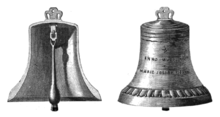Jingle bell

A jingle bell or sleigh bell is a type of bell which produces a distinctive 'jingle' sound, especially in large numbers. They find use in many areas as a percussion instrument, including the classic sleigh bell sound and morris dancing. They are typically used as a cheaper alternative to small 'classic' bells.

The simplest jingle bells are produced from a single piece of sheet metal bent into a roughly spherical shape to contain a small ball bearing or short piece of metal rod. This method of production results in the classic two- or four-leaved shape. Two halves may also be crimped together, resulting in a ridge around the middle. A glass marble may also be used as the ringer on larger bells.
History
Bells of this type were developed centuries ago for fastening to harnesses used with horses or teams of horses.[1] Typically they were used for horse-drawn vehicles, such as carriages and sleighs. The bell was designed to make sound whenever the horse and thus the vehicle was in motion. The purpose was perhaps to herald the approach of someone important, or likely to warn pedestrians of the vehicle's approach so that they might step aside to avoid collisions and potential injuries. This was especially important for sleighs, which otherwise make almost no sound as they travel over packed snow, and are difficult to stop quickly.
Uses
.jpg)
Jingle bells are commonly used on Christmas decorations or as Christmas ornaments themselves, or hung around the neck like a necklace. They can also be strung onto a heavy wire and bent into a wreath shape, usually with a metal bow. Rather than the cross-shaped opening in the bottom, other designs may be cut into the bell, such as a snowflake. Small designs like stars may also be cut into the upper part of the bell. "
Like many Christmas decorations, jingle bells are also made in versions for other holidays, such as a jack-o'-lantern for Halloween.
Gustav Mahler makes use of jingle/sleigh bells in his Symphony No. 4.
Sergei Prokofiev calls for sleigh bells in his Lieutenant Kijé Suite.
